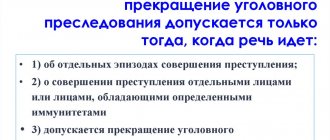Article 27 of the Code of Criminal Procedure of the Russian Federation. Grounds for termination of criminal prosecution (current version)
1. The Code of Criminal Procedure of the Russian Federation applies a new and rather complex legal structure, within the framework of which an attempt is made to separate the grounds for terminating a criminal case (refusal to initiate a criminal case) and the grounds for terminating criminal prosecution. According to the general meaning of ch. 4, 29 and a number of other norms of the Code, termination of criminal prosecution without termination of the criminal case as a whole can occur in two situations:
1) the circumstances leading to the termination of procedural proceedings do not apply to all, but only to one or several suspects (accused), and in relation to other persons, including those not yet identified, the criminal case and criminal prosecution can and should be continued. This may occur in the following cases: a) it is established that the suspect or accused is not involved in the commission of a crime (clause 1, part 1, article 27); b) issuing an amnesty act, which covers not all, but only some of the suspects or accused (clause 3, part 1, article 27); c) if there are grounds specified in Art. 24 (clause 2, part 1, article 27). In case of application of Art. 24 these grounds would serve only to terminate the criminal case, but as grounds for termination of the criminal prosecution, they apply not to all, but only to individual suspects or accused, and therefore do not entail the termination of the entire case as a whole, but only the criminal prosecution of individuals. So, for example, the absence of corpus delicti in the actions of a person involved among several accomplices (clause 2, part 1, article 24) entails termination of criminal prosecution in relation to him, but in relation to the rest, the proceedings continue. The same can be said in relation to: a) the expiration of the statute of limitations (clause 3, part 1, article 24), for example, when one of the accomplices is a minor and the statute of limitations against him is in accordance with art. 94 of the Criminal Code is reduced by half; b) lack of consent of the court to initiate a case or bring as an accused one of the persons with official immunity (clause 6, part 1, article 24), etc.;
2) criminal prosecution is terminated in relation to the charges brought - for individual episodes (crimes), if they are not confirmed (Part 2 of Article 175 of the Code of Criminal Procedure). Proceedings on the remaining charges continue.
2. In the cases provided for by this article, termination of criminal prosecution is possible only in relation to suspects or accused, i.e., as a rule, only after the initiation of a criminal case (the exception is the case when a person is actually detained as a suspect even before the initiation of a criminal case in accordance with Articles 91, 92).
3. The subjects of the right to terminate criminal prosecution are only state bodies and officials leading the process and at the same time carrying out criminal prosecution: the investigator, the head of the investigation department and the interrogating officer. They can terminate criminal prosecution either without terminating the criminal case (Part 4 of Article 27) or with its simultaneous termination (Part 1 of Article 212).
The court is not the subject of termination of criminal prosecution, because in principle it does not have the right to carry out criminal prosecution, therefore, in the cases provided for in paragraphs 3 - 6 of Part 1 of Art. 24 and paragraphs 3 - 6, part 1, art. 27, as well as Art. 28, the court terminates not the criminal prosecution, but the criminal case (Articles 239, 254).
The inquiry body has the right to initiate a criminal case in which a preliminary investigation is mandatory (Part 1 of Article 157), and therefore refuse to initiate it, but in these cases it is not endowed with the right to terminate such a criminal case or criminal prosecution.
4. On the concept of non-involvement of the suspect or accused in the commission of a crime, see paragraph 14 of the commentary. to Art. 5.
5. Termination of criminal prosecution as a result of the adoption of an amnesty act is possible only if it releases the person from criminal liability. If the conditions for the application of the amnesty imply in relation to a given person only exemption from the application of punishment, its reduction or replacement with a milder form, the subject of the application of the amnesty is only the court, which does not terminate the criminal case, but passes a conviction with the imposition of a sentence and exemption from serving it ( clause 1, part 6, article 302).
6. A sentence that has entered into legal force against a suspect or accused on the same charge, a court ruling or a judge’s decision to terminate a criminal case on the same charge (clause 4, part 1, article 27) are prejudicial acts that exclude the possibility of carrying out any -procedural actions in relation to the suspect or accused, since repeated prosecution for the same crime based on the meaning of Part 1 of Art. 50 of the Constitution of the Russian Federation is not allowed (the principle of non bis in idem). It should, however, be taken into account that according to Art. 90 of the Code of Criminal Procedure (“Prejudice”), circumstances established by a sentence that has entered into legal force are recognized without additional verification, only if these circumstances do not raise doubts in the court. Thus, only the court has the right to doubt the truth of a previously decided verdict, but not the investigator and interrogating officer, for whom a verdict in another case that has entered into legal force is, in any case, mandatory and entails the termination of criminal prosecution (see paragraph 1 of the comment. to Article 90). Paradoxically, the discovery at a court hearing of an unreversed decision of an investigator, investigator or prosecutor made against the accused (defendant) to terminate criminal prosecution on the same charge or to refuse to initiate a criminal case is a mandatory basis for termination of criminal prosecution not only for others by an investigator or inquiry officer, but also to terminate a criminal case against a given person by the court. See about this: paragraph 4 comment. to Art. 254 of this Code. The Constitutional Court of the Russian Federation in one of its decisions confirmed that the court is obliged to terminate a criminal case if it reveals the presence of an investigator’s decision to terminate a criminal case that has not been canceled in accordance with the procedure established by law due to the absence of corpus delicti in the actions of the accused.
———————————
See: Resolution of the Constitutional Court of the Russian Federation of December 8, 2003 N 18-P “In the case of verifying the constitutionality of the provisions of Articles 125, 219, 227, 229, 236, 237, 239, 246, 254, 271, 378, 405 and 408, as well as chapters 35 and 39 of the Code of Criminal Procedure of the Russian Federation in connection with requests from courts of general jurisdiction and complaints from citizens” // RG. 2003. 23 Dec. N 257.
The prosecutor's decision to cancel the decision to initiate a case (Part 4 of Article 146) is also the basis for terminating the criminal prosecution of the suspect or accused.
7. On the grounds for termination of criminal prosecution, provided for in paragraph 6, part 1, art. 27, see comment. to ch. 52 of this Code.
8. According to paragraph 4, in the cases provided for by this article, it is only allowed to terminate the criminal prosecution against the suspect or accused without terminating the criminal case. This means that the investigator and interrogator have the right, having terminated the criminal prosecution on the grounds mentioned in this article, to terminate the criminal case as a whole if they come to a reasonable conclusion that it is not possible to identify or expose other persons involved in the commission of the crime, or to hope for the disappearance in the future of conditions preventing the continuation of criminal prosecution against this person.
9. In the event of termination of criminal prosecution against all suspects or accused in a given criminal case, the latter is also terminated entirely, with the exception of cases of termination of criminal prosecution due to the non-involvement of the suspect or accused in the commission of a crime (part 4 of article 24, paragraph 1 of part 1 Art. 27). This exception is explained by the fact that establishing a person’s non-involvement in the crime committed, as a rule, does not eliminate the need to identify the true culprit of the crime.
10. For the procedure for terminating criminal prosecution, see commentary. to Art. Art. 148, 175, 212 - 214.
Comment source:
Ed. A.V. Smirnova “COMMENTARY ON THE CRIMINAL PROCEDURE CODE OF THE RUSSIAN FEDERATION” (ARTICLE BY ARTICLE), 5th edition
SMIRNOV A.V., KALINOVSKY K.B., 2009
Amnesty in the Criminal Procedure Code of the Russian FederationArticle 27 of the Criminal Procedure Code of the Russian Federation establishes that amnesty falls under the general requirements of the procedure for terminating criminal prosecution. Among other things, this also means that the procedure for terminating prosecution under an amnesty distinguishes between the cessation of a criminal case (refusal to initiate a case) and the cessation of prosecution for a specific incriminated action (inaction). This distinction is necessary because of the criminal case. for example, it may be initiated against several suspects (accused), among whom there may be persons to whom the amnesty does not apply; a case may contain several episodes (crimes), but the amnesty does not apply to individual episodes, etc. If the amnesty act exhausts all elements of a given criminal case and the range of subjects of responsibility, then the criminal case should be terminated, and vice versa.
Termination of criminal prosecution on the commented grounds applies only to suspects and accused, and therefore, it is possible after the initiation of a case - at the stages of pre-trial and trial proceedings.
After the amnesty act enters into legal force, the termination of criminal prosecution is carried out by the state bodies leading the prosecution process - the investigator, the head of the investigation agency or the interrogating officer. These persons may cease prosecution if the act of criminal amnesty provides for exemption from liability in this case. The court dismisses the criminal case.
A criminal amnesty act may provide that the person being prosecuted is released from liability. When an amnesty exempts a person from punishment, reduces a sentence, or replaces a more severe punishment with a mild one, the court renders a verdict of guilty, in which it imposes a more lenient punishment, or imposes a punishment and releases it.
The law establishes that the accused may not agree to the termination of criminal prosecution. The same applies to the accused. If the accused or suspect declares such disagreement, the proceedings (consideration) of the case continue as usual. The RSFSR Code of Criminal Procedure, which was in force before the adoption of the Code of Criminal Procedure of the Russian Federation, did not provide for such a disposition, which was interpreted by the courts as a requirement to terminate proceedings without any options. This practice was stopped after the Constitutional Court of the Russian Federation adopted Resolution No. 18-P of October 28, 1996 in the case of verifying the constitutionality of Article 6 of the Criminal Procedure Code of the RSFSR in connection with the complaint of citizen O.V. Sushkova. This resolution is also relevant due to the clarification of the Constitutional Court of the Russian Federation that the release by the court from criminal liability and punishment from the amnesty should not be regarded as a statement of guilt or lack thereof of the accused. This means that the termination of proceedings will not have any prejudicial significance in matters of guilt, but will have significance as a statement of the fact of the commission of the act. Actually, in order to challenge the statement of the fact of the act, the accused needs the right to challenge the termination of proceedings under the amnesty.
Later, on July 15, 2008, in Determination No. 501-O-O on the refusal to accept for consideration the complaint of citizen Olga Semenovna Sokolova about the violation of her constitutional rights by paragraph 3 of part one and part two of Article 27, Articles 212 and 213 of the Criminal Procedure Code of the Russian Federation and part one of Article 71 of the Civil Procedure Code of the Russian Federation, the Constitutional Court of the Russian Federation clarified its position regarding the prejudice to terminate prosecution under amnesty in civil proceedings. According to the court, the decision to terminate the criminal case under amnesty is not prejudicial from the point of view of Art. 71 Code of Civil Procedure of the Russian Federation. Only a sentence can be such. The decision in question can be considered by the courts as ordinary written evidence, which requires additional verification. see further commentary to Art. 133 of the Code of Criminal Procedure of the Russian Federation, see below the commentary to Art. 213 of the Code of Criminal Procedure of the Russian Federation, see below the commentary to Art. 302, 472 Code of Criminal Procedure of the Russian Federation
CRIMINAL PROCEDURE CODE OF THE RUSSIAN FEDERATION N 174-FZ of December 18, 2001
Article 27. Grounds for termination of criminal prosecution
1. Criminal prosecution against a suspect or accused is terminated on the following grounds:
3) as a result of the amnesty act;
2. Termination of criminal prosecution on the grounds specified in paragraphs 3 and 6 of the first part of Article 24, Articles 25 and 28 of this Code, as well as paragraphs 3 and 6 of the first part of this article, is not allowed if the suspect or accused objects to this. In this case, the criminal proceedings continue as usual.
4. In the cases provided for by this article, it is permitted to terminate criminal prosecution against a suspect or accused without terminating the criminal case.
Everything about criminal cases
Go to the text of the Code of Criminal Procedure
Url Additional information:
Termination of criminal prosecution
- Clause 1 Part 1 27 Code of Criminal Procedure
if the person is not involved in the crime
— clause 2, part 1, 27 Code of Criminal Procedure
if the case is dismissed on the grounds of
part 1 24 of the Code of Criminal Procedure
- clause 3 of part 1 27 of the Code of Criminal Procedure
cessation of prosecution under an amnesty act
- clause 4 part 1 27 Code of Criminal Procedure
if there is already a verdict on this fact
- clause 5 part 1 27 Code of Criminal Procedure
if there is already a refusal to initiate proceedings on this fact
- Part 3 27 Code of Criminal Procedure
if the age of responsibility is not reached
— Part 3 27 Code of Criminal Procedure
if there is a lag - in mental development
Consent required to terminate
- Part 2 27 Code of Criminal Procedure
consent is required for termination - according to the statute of limitations
- Part 2 27 Code of Criminal Procedure
consent is required for termination - for special subjects
- Part 2 27 Code of Criminal Procedure
consent is required for termination - by reconciliation
- Part 2 27 Code of Criminal Procedure
Consent required to terminate - subject to legal fine
- Part 2 27 Code of Criminal Procedure
consent is required to terminate - based on active repentance
- Part 2 27 Code of Criminal Procedure
consent is required for termination - according to economic composition
- Part 2 27 Code of Criminal Procedure
consent required for termination - under amnesty
Case continues
- Part 2 27 Code of Criminal Procedure
If there are objections, the case continues as usual
Without stopping the case completely
- Part 4 27 Code of Criminal Procedure
termination of prosecution without termination of the criminal case
Practical aspects
Termination of criminal case
, selection of materials and regulatory framework
Article 27 of the Code of Criminal Procedure. Grounds for termination of criminal prosecution
Url Additional information:
I). Termination of the case at the investigation stage
(and inquiries)
— 212 Code of Criminal Procedure
grounds for termination of the case at the investigation stage
— 213 Code of Criminal Procedure
dismissal order
— 214 Code of Criminal Procedure
cancellation by the prosecutor of the decision to dismiss the case
- part 1 125 of the Code of Criminal Procedure
appealing a decision to terminate a criminal case
— clause 2
Plenum No. 1, the termination of the criminal case is appealed in accordance with Article
125 of the Code of Criminal Procedure
- paragraph 15
Plenum No. 1 review by the court of the legality of termination of the case
Appeal against a termination order
- part 1 125 of the Code of Criminal Procedure
appealing to the court the termination of a criminal case
- Part 2 214 Code of Criminal Procedure
reversal of the court's order to dismiss the case
- paragraph 15
Plenum No. 1 review by the court of the legality of termination of the case
- paragraph 21
Plenum No. 1 the court declared the termination illegal
II). Termination of the case at the preliminary hearing
— 239 Code of Criminal Procedure
dismissal of the case at the preliminary hearing
- paragraph 20
Plenum No. 28 termination of the case in the preliminary hearing
- paragraph 24
Plenum No. 19 termination of the case in the preliminary hearing
III). Termination of the case in the court
of the first instance
- 254 Code of Criminal Procedure
termination of the case in court
- paragraph 25
Plenum No. 19, if the person agrees to terminate, the case is terminated
- paragraph 25
Plenum No. 19 in case of disagreement, sentence with release from punishment
IV). Termination of case on appeal
- clause 1, part 2 389.17 Code of Criminal Procedure
non-termination if there are grounds, grounds for cancellation
— 389.21 Code of Criminal Procedure
termination of a criminal case during the appeal stage
- P.
Plenum No. 48 if the court did not dismiss the case based on the economic composition
- paragraph 27
Plenum No. 19 termination of the case at the appeal stage
V). Termination of the case in cassation
— Clause 2 Part 1 401.14 Code of Criminal Procedure
termination of a criminal case at the cassation stage
1) Criminal prosecution against a suspect or accused is terminated on the following grounds:
Url Additional information:
Non-involvement (regulatory framework)
— clause 20 of article 5 of the Code of Criminal Procedure
concept of non-involvement
- Part 4 24 Code of Criminal Procedure
criminal prosecution is terminated, but the criminal case is not
- Clause 1 Part 1 27 Code of Criminal Procedure
non-involvement entails the cessation of persecution
— clause 3, part 2, 133 Code of Criminal Procedure
termination due to non-involvement is rehabilitative
- part 2 212 of the Code of Criminal Procedure
termination due to non-involvement - entails rehabilitation measures
- Part 7 246 Code of Criminal Procedure
refusal of the prosecutor to charge - dismissal due to non-involvement
- clause 2, part 2 302 of the Code of Criminal Procedure
acquittal if the defendant is not involved
- Part 3 306 Code of Criminal Procedure
if there is no involvement, the case is sent to identify the person
— P.
Plenum No. 43 other new circumstances (non-involvement in a crime)
1). non-involvement of the suspect or accused in the commission of a crime;
2). termination of a criminal case on the grounds provided for in clauses 1 - clause 6 of part 1 of 24 Code of Criminal Procedure;
Url Additional information:
- P.22
Plenum No. 21 application of amnesty in execution of a sentence
3). as a result of the amnesty act;
4). the presence in relation to the suspect or accused of a sentence on the same charge that has entered into legal force, or a court ruling or a judge's decision to terminate the criminal case on the same charge;
5).
the presence in relation to the suspect or accused of an unrescinded resolution of the body of inquiry, investigator or prosecutor to terminate the criminal case on the same charge or to refuse to initiate a criminal case;
6). refusal of the State Duma of the Federal Assembly of the Russian Federation to give consent to the deprivation of immunity of the President of the Russian Federation who has ceased to exercise his powers, and (or) refusal of the Federation Council to deprive the immunity of this person.
Url Additional information:
— clause 15, part 4, 47 Code of Criminal Procedure
right of the accused to object to the dismissal of the case
- Part 3 213 Code of Criminal Procedure
consent of the accused in the order to dismiss the case
- paragraph 21
Plenum No. 19 mandatory consent of a person to terminate a case
— P.
Plenum No. 51, the court must explain the consequences of termination of the case
- paragraph 25
Plenum No. 19, if the person agrees to terminate, the case is terminated
- paragraph 25
Plenum No. 19 in case of disagreement - sentence with exemption from punishment
Agreement
Person's consent to termination
, two options for court decisions (
clause 25
of Plenum No. 19)
2) Termination of criminal prosecution is not allowed if the suspect or accused objects to this, on the grounds specified in:
— Clause 1 Part 1 24 Code of Criminal Procedure
(termination of the case due to statute of limitations),
— Clause 6 Part 1 24 Code of Criminal Procedure
(there is no consent to a criminal case on special subjects),
— 25 Code of Criminal Procedure
(reconciliation with the victim),
— 25.1 Code of Criminal Procedure
(termination with imposition of a court fine),
— 28 Code of Criminal Procedure
(cessation due to active repentance),
— 28.1 Code of Criminal Procedure
(termination due to economic reasons),
— Clause 3 Part 1 27 Code of Criminal Procedure
(release under amnesty),
— Clause 6 Part 1 27 Code of Criminal Procedure
(refusal regarding the President of the Russian Federation).
In this case, the criminal proceedings continue as usual.
3) Criminal prosecution against a person who, at the time of committing the act, has not reached the age at which criminal liability begins, provided for by criminal law, is subject to termination on the basis specified in paragraph 2 of Part 1 of 24 of the Code of Criminal Procedure.
Url Additional information:
— Part 3 20 Criminal Code
developmental delay termination of criminal prosecution
- Part 2 421 Code of Criminal Procedure
the court is obliged to verify the fact of developmental delay
- paragraph 14
Plenum No. 1 mental retardation
On the same basis, criminal prosecution is also subject to termination in relation to
a minor who, although he has reached the age at which criminal responsibility begins, but due to mental retardation not associated with a mental disorder
,
could not fully understand the actual nature and social danger of his actions (inaction) and manage them at the time of commission of an act provided for by criminal law.
Url Additional information:
- Part 3 24 Code of Criminal Procedure
termination of the case entails termination of prosecution
- Part 4 24 Code of Criminal Procedure
if the persecution of everyone is stopped, then the case is terminated
4) In the cases provided for by this article, it is permitted to terminate criminal prosecution against a suspect or accused without terminating the criminal case.
Return to the text of the Code of Criminal Procedure
Seek advice





